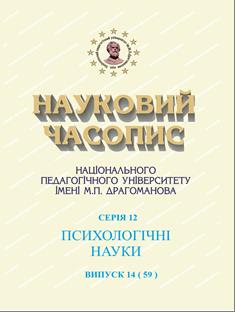VOLUNTARY QUALITIES OF ADVENTURE AND NON-ADVENTURE PERSONS
DOI:
https://doi.org/10.31392/NPU-nc.series12.2021.14(59).06Keywords:
adventurism, tendency to adventurous behavior, volitional qualities of personality, personality trait, quantitative analysis, qualitative analysisAbstract
The theoretical analysis of the research to define such phenomena as “adventurousness”, “adventure” and “adventurism” was done. Adventurousness (propensity for adventurous behavior) as a complex property of personality, is considered from the standpoint of a continuous-hierarchical approach to the structure of personality. The urgency of the problem is related to the need to study the volitional qualities and personality traits that require bold, fast, risky and adventurous actions in conditions of high uncertainty. For the empirical verification the following techniques were selected: the original psychodiagnostic “Test-questionnaire of propensity to adventure” (AVANT-1) by O. Sannikova, O. Sannikov, N. Melenchuk and the method “Volitional qualities of personality” by M. Chumakov. The results of the correlation analysis between indicators of adventurism and volitional qualities of personality traits are presented. There are mostly positive significant correlations between all indicators of adventurousness and most indicators of volitional qualities of personality: indicators of determination (Rsh), initiative (In), independence (Sm) and perseverance (Np). This is with the exceptions of responsibility (Vd) and purposefulness (Cl), with which there are negative significant relationships. Based on the qualitative analysis of empirical data, the specifics of volitional qualities of personality in “adventurous” and “non-adventurous” individuals have been studied. Adventurous personalities are considered to be much more decisive, independent, proactive and persistent in comparison with non-adventurous ones. They tend to show confidence, independence, courage, determination, independence, high creativity, productivity and perseverance in achieving their goals. It has been established that non-adventurous individuals, in contrast to adventurous individuals, are more responsible and purposeful. The results of the study show that the level of conscious regulation of behavior, its power over themselves is more pronounced in adventurous individuals than in individuals with a low level of adventurism.
References
- Busel, V.T. (Е) (2005). Velykyi tlumachnyi slovnyk suchasnoi ukrainskoi movy (z dod. i dopov.) [Large explanatory dictionary of the modern Ukrainian language]. Kyiv; Irpin : VTF “Perun” [in Ukrainian].
- Evgenev, A.P. (Е). (1981). Slovar’ russkogo jazyka: v 4-h tt. [Dictionary of the Russian language: in 4 vols.] (2nd. ed.). (Vol. 1. A–J) [in Russian].
- Zhmurov, V.A. (2010). Bol’shoj tolkovyi slovar' po psyhyatryy [The Big Explanatory Dictionary of Psychiatry]. Elista : Dzhangar [in Russian].
- Melenchuk, N.I. (2016). Psykholohichni chynnyky skhylnosti osobystosti do avantiurnoi povedinky [Psychological factors of propensity of the individual to adventurous behavior]. Candidate’s thesis. Odesa [in Ukrainian].
- Oldhem, Dzh., & Morrys, L. (1996). Avtoportret vashej lychnosty: Kak luchshe uznat’ samogo sebja [Self-portrait of your personality: How to get to know yourself better]. Moscow : Veche, AST [in Russian].
- Sannikova, O.P. (1995). Emotsionalnost’ v strukture lichnosti [Emotionality in the structure of personality]. Odessa : Khors [in Russian].
- Sannikova, O.P., Sannikov, O.I., & Melenchuk, N.I. (2015). A.s. Psykhodiahnostyka avantiurnosti: “Test-opytuvalnyk skhylnosti do avantiurnosti” (AVANT-1); “Samootsinka komponentiv avantiurnosti” [A.s. Adventurous Psychodiagnostics: “Test-questionnaire to define the tendency to adventurism” (AVANT-1); “Self-Assessment of Adventure Components”], application № 60141; registration № 59701 [in Ukrainian].
- Chumakov, M.V. (2006). Diagnostika volevyh osobennostej lichnosti [Diagnostics of volitional personality traits]. Voprosy psihologii – Psychology issues, 1, 169–178 [in Russian].
- Chumakov, M.V. (2007). Jemocional’no-volevaja reguljacija dejatel’nosti (struktura, tipy, osobennosti funkcionirovanija v social’nom vzaimodejstvii) [Emotional-volitional regulation of activity (structure, types, features of functioning in social interaction)]. Kurgan: Izd-vo Kurganskogo gos. un-ta [in Russian].
- Bowen, D.J., Neill, J.T., & Crisp, S.J. (2016). Wilderness adventure therapy effects on the mental health of youth participants. Evaluation and Program Planning, 58, 49–59.
doi: 10.1016/j. evalprogplan.2016.05.005.13 - Houge Mackenzie, S., & Brymer, E. (2020). Conceptualizing adventurous nature sport: A positive psychology perspective. Annals of Leisure Research, 23(1), 79–91. https://doi.org/10.1080/11745398.2018.1483733
- Roth, (1980). Aventure et aventuriers au XVIIIe siècle. Essai de sociologie Iittéraire. Thèse, Lille. (Т. 1–2).
- Sannikova O., Melenchuk N., & Sannikov A. (2021). Adventurousness of personality: Construct and diagnostics. Georgian Medical News, 2(311), 109–115.

